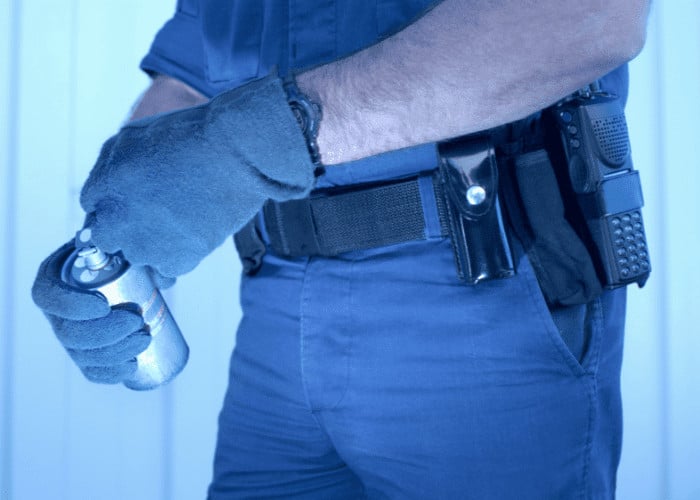A primary tool of law enforcement officers and paramilitary groups is tear gas, which is typically used to subdue and flush out fugitives or criminals holding hostages or entrenched behind heavy cover.
So, since dogs may be around this irritating gas, that begs the question: Are Dogs Immune to Tear Gas?
Dogs are not immune to tear gas, and they are just as susceptible to its irritating and debilitating effects as humans are. Because of their keen senses of smell, they may even suffer worse side effects from it than we do.
In this article, we’re going to examine just how much tear gas affects dogs, why they may be so sensitive to it, and what exactly tear gas does to one who is subjected to it. Please keep reading to learn everything you need to know about tear gas and whether or not dogs are immune to its effects.
What is Tear Gas?

Tear gas, also known as a lachrymator agent, is a chemical compound used in riot control and combat situations to force enemies or crowds to disperse. This gas is so effective because it causes severe irritation to the eyes, causing heavy watering from the eyes and difficulty seeing.
In addition to simple eye irritation, it can cause severe eye and respiratory pain, bleeding, blindness, and skin irritation. A few common types of tear gas are Mace and pepper spray, which are often used to deter large predatory animals such as bears and wildcats, as well as criminals or other assailants.
Tear gas usually isn’t a gas, and it is so effective against canines because tear gas is mainly made up of aerosolized solid or liquid compounds, which are harder to get out of the eyes and nose and stick to the skin much better than gas.
Irritation from tear gas is caused by irritants attacking the mucous membranes in the eyes, nose, mouth, and lungs, causing the crying, sneezing, coughing, respiratory difficulty, eye pain, and momentary blindness.
Even though tear gas is not technically a lethal weapon, it can still have lasting effects on individuals who were exposed to enough of it. Those with preexisting respiratory conditions like asthma may experience respiratory complications after being subjected to tear gas and require ventilation and hospitalization.
Eye injuries can also last if exposed to enough gas, leading to cornea scarring. This injury can result in a permanent loss of visual acuity.
To neutralize the effects of tear gas, water should be poured over the affected areas. So if for some reason a dog is exposed to tear gas, use water to help flush their eyes, nose, mouth, and skin of the irritant.
Why Does Tear Gas Affect Dogs So Much?

The main reason dogs are affected too much by tear gas is that their olfactory lobes are much larger than ours, and the size of this part of their brains is one of the reasons they have such acute senses of smell. A canine or k9’s sense of smell is so strong that it can sniff out bombs, drugs, lost people or objects, and even cancer in cancer patients.
Another key structure that allows their sense of smell to be strong is a specially adapted olfactory epithelium, a specialized tissue lining their nasal cavities. This membrane is stuffed full of olfactory neurons, allowing them to pick up on faint smells.
To put this into perspective for you, a human’s olfactory epithelium covers only about 10 square centimeters of the nasal area, while a dog’s covers around 170 square centimeters. The more area the membrane covers, the better your sense of smell. So, as you can see, dogs are equipped with the right anatomy to have a highly acute sense of smell.
Because dogs can smell so well, they are also more sensitive to strong smells and irritants, like tear gas. The pain a human feels in their nose and eyes from tear gas is most likely multiplied many times when a dog comes into contact with it. Their noses are so sensitive that, in some cases, dogs have been known to bleed from their nose when exposed to the irritants in tear gas.
Signs and Symptoms of Dogs’ Reaction to Tear Gas

When exposed to tear gas, there are a few signs that you’ll notice dogs exhibiting. When the tear gas first comes into contact with a dog, its eyes will start to water profusely, and its nose will also begin to run and may even start bleeding.
You’ll also be able to tell because the dog will most likely act differently in reaction to the gas. They might start to whine, whimper, or paw at their nose and eyes. This is a reaction to the acute pain caused by tear gas, which irritates the mucous glands in the eyes, nose, mouth, and lungs.
Dogs may have extreme reactions to tear gas and stop moving, choosing to stay in one place because they can’t see clearly and the pain is too much for them to continue functioning normally.
Final Thoughts

Many may wonder if dogs are immune to the effects of tear gas, and the answer is that they are not. Dogs trained very well, such as those in the military or law enforcement, may not always show that they are affected by it, as their training takes over their need to respond.
However, in most cases, a dog will probably feel the effects of tear gas more acutely than you or I would. This is partly due to the unique anatomy that makes them such amazing smellers.
Their brains and noses are built for smelling, with the ability to sniff things out like bombs, drugs, and even cancer. It makes sense, then, that dogs would feel the effects of tear gas just as strongly as humans would, if not more so.
Tear gas is a compound designed to irritate the eyes, nose, and throat by attacking one’s mucous membranes. It can be extremely irritating and strong, causing severe pain in the eyes, nose, mouth, and lungs and also causing temporary blindness. When exposed to tear gas, water should be applied to help to reduce the effects. This treatment can work just as well for a dog as it can for a human.
We hope the information outlined in this article has answered all of your questions about whether or not dogs are immune to tear gas. For more interesting animal facts, check out our other articles.

